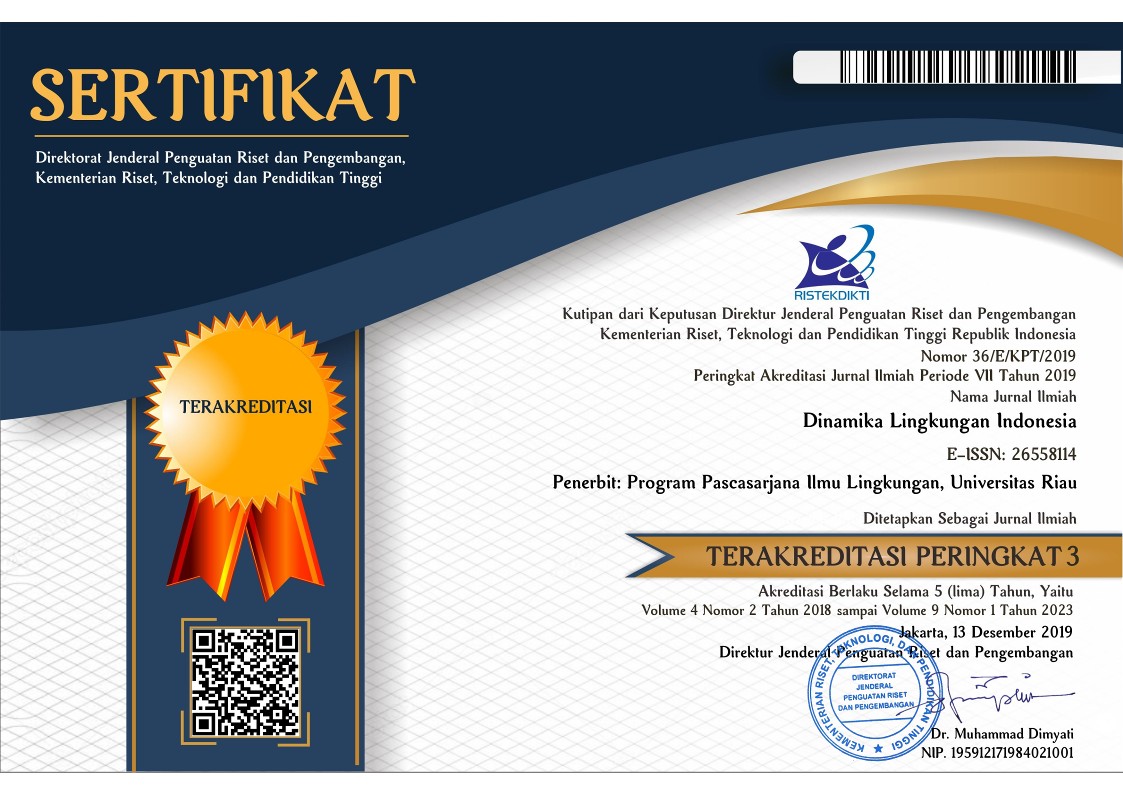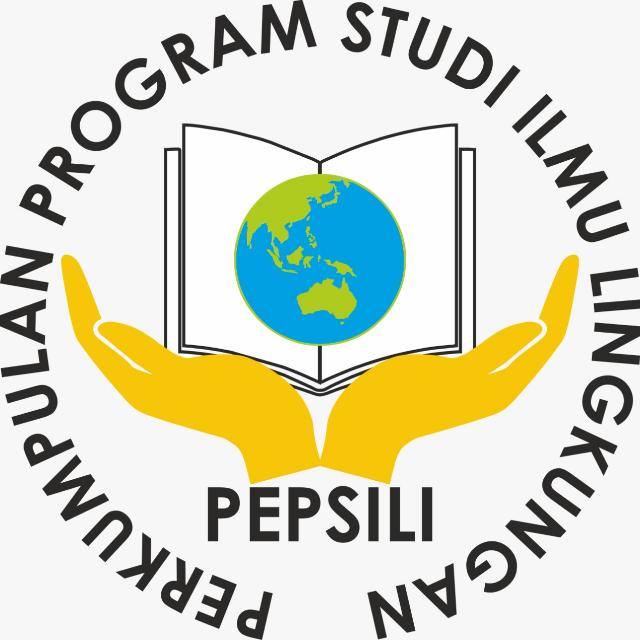Perbandingan Konsentrasi Detergen Akibat Pandemi COVID-19 dan Kebiasaan Baru (New Normal) Pada Kualitas Air Permukaan Kota Palangka Raya
Abstract
Currently, the Indonesian nation is facing challenges that require human resources adapt to the COVID-19 pandemic situation. Has the discovery of a vaccine and the implementation of ongoing vaccination does not guarantee avoid the spread of COVID-19. Thus, the obligation to implement the protocol health continues. One of the health protocol policies is provide adequate hand washing facilities for the management public facilities. The behavior of washing hands with soap is part of the program Clean and Healthy Life Behavior (PHBS) in the household. Washing hands Using soap is an effective step to break the chain of transmission COVID-19. However, please note that hand soap contains detergent. The results of using detergent (hand soap) will produce residue in the form of liquid waste, which is then discharged into the environment directly cause the balance of nature to be disturbed, namely soil pollution which causes capable of changing soil pH, changing mineral content and nutrient disturbances from soil for plant life and polluted groundwater sources. On research In this case, identifying and analyzing the waste from washing hands with soap in public facilities can affect the environment and the amount of content detergents that dissolve in water and whether nature can neutralize water pollution that occurred before and after the COVID-19 pandemic.
Keywords
Full Text:
PDFReferences
Babtain, F., Atteyah, D., Milyani, H., Banjer, T., Alqadi, K., Baeesa, S., & al Said, Y. (2021). The Safety and Efficacy of Modifying The Admission Protocol to The Epilepsy Monitoring Unit in Response to The COVID-19 Pandemic. Epilepsy and Behavior, 122, 1–7. https://doi.org/10.1016/j.yebeh.2021.108229.
Cassiello-Robbins, C., Rosenthal, M. Z., & Ammirati, R. J. (2021). Delivering Transdiagnostic Treatment Over Telehealth During the COVID-19 Pandemic: Application of the Unified Protocol. Cognitive and Behavioral Practice, 28(4), 555–572. https://doi.org/10.1016/j.cbpra.2021.04.007.
Fadli, F., Safruddin, S., Ahmad, A. S., Sumbara, S., & Baharuddin, R. (2020). Faktor yang Mempengaruhi Kecemasan pada Tenaga Kesehatan Dalam Upaya Pencegahan Covid-19. Jurnal Pendidikan Keperawatan Indonesia, 6(1), 57–65. https://doi.org/10.17509/jpki.v6i1.24546.
Fazlisia, A., Bahar, E., & Yulistini. (2014). Uji Daya Hambat Sabun Cair Cuci Tangan pada Restoran Waralaba di Kota Padang Terhadap Pertumbuhan Bakteri Escherichia coli dan Staphylococcus aureus Secara In Vitro. Jurnal Kesehatan Andalas, 3(3), 348–353. https://doi.org/10.25077/jka.v3i3.116.
Hidayatullah, H., & Nasrullah, N. (2020). Enforcement of Health Law: The Large Scale Social Limitation In Indonesia Viewed of The Theory Of Al-Maqashid Asy-Syar’iyyah. Syariah: Jurnal Hukum Dan Pemikiran, 20(1), 41. https://doi.org/10.18592/sjhp.v20i1.3633.
Hu, H., Ji, Z., Feng, C., Pang, W., Chen, Z., Zhang, J., & Wang, H. (2021). PROSPERO’s systematic review protocols of traditional Chinese medicine for COVID-19: An overview. In Integrative Medicine Research (Vol. 10). Korea Institute of Oriental Medicine. https://doi.org/10.1016/j.imr.2021.100774.
Joshi, U., Khan, A., Muke, S., Choubey, S., Tugnawat, D., Naslund, J. A., & Bhan, A. (2021). Development and implementation of COVID-19 safety protocols for conducting a randomized trial in global mental health: Field report from Central India. Asian Journal of Psychiatry, 63. https://doi.org/10.1016/j.ajp.2021.102750.
Kusumawardani, Y., Subekti, S., & Soehartono, S. (2019). Potential and Effects of Banana Stems as Filter Media in Motor Vehicle Washing Wastewater Treatment | Kusumawardani | Jurnal Presipitasi : Media Komunikasi dan Pengembangan Teknik Lingkungan. Jurnal Presipitasi: Media Komunikasi Dan Pengembangan Teknik Lingkungan, 16(3), 196–204. https://doi.org/10.14710/presipitasi.v16i3.196-204.
Mujani, S., & Irvani, D. (2020). Sikap dan Perilaku Warga terhadap Kebijakan Penanganan Wabah Covid-19. Politika: Jurnal Ilmu Politik, 11(2), 219–238. https://doi.org/10.14710/politika.11.2.2020.219-238.
Närhi, F., Moonesinghe, S. R., Shenkin, S. D., Drake, T. M., Mulholland, R. H., Donegan, C., Dunning, J., Fairfield, C. J., Girvan, M., Hardwick, H. E., Ho, A., Leeming, G., Nguyen-Van-Tam, J. S., Pius, R., Russell, C. D., Shaw, C. A., Spencer, R. G., Turtle, L., Openshaw, P. J. M., … Young, P. (2022). Implementation of corticosteroids in treatment of COVID-19 in the ISARIC WHO Clinical Characterisation Protocol UK: prospective, cohort study. The Lancet Digital Health, 4(4), 220–234. https://doi.org/10.1016/S2589-7500(22)00018-8.
Nurhidayanti, N., Ardiatma, D., & Tata, T. (2021). Studi Pengolahan Limbah Greywater Domestik menggunakan Sistem Hidroponik dengan Filter Ampas Kopi. Jurnal Tekno Insentif, 15(1), 15–29. https://doi.org/10.36787/jti.v15i1.394.
Santoso, Achmad Imam. (2021). Analisis Dampak Implementasi Kebijakan Kementrian Kesehatan tentang Protokol Kesehatan Selama Covid-19 terkait Cuci Tangan dengan Sabun terhadap Kualitas Air di Fasilitas Umum Palangkaraya. Universitas Muhammadiyah Palangkaraya. Laporan penelitian.
Siregar, S., & Kiswiranti, D. (2020). Analisis Kualitas Air Tanah Akibat Pengaruh Sungai Klampok yang Tercemar Limbah Industri di Kecamatan Bergas Semarang Jawa Tengah. Jurnal Manusia Dan Lingkungan, 26(1), 36. https://doi.org/10.22146/jml.39962.
Sulaeman, R. Ns., Lestari, R. D., Dramawan, A., & Purnamawati, D. (2022). Pengaruh Metode Simulasi Terhadap Keterampilan Pelaksanaan Kegiatan 3M (Mencuci Tangan, Memakai Masker, Menjaga Jarak) Pada Siswa Sekolah Menengah Pertama. Aksara: Jurnal Ilmu Pendidikan Nonformal, 8(1), 733–740. https://doi.org/10.37905/aksara.8.1.733-740.2022.
Putro, D. S., & Santoso, A. I. (2022). Dampak Penerapan Protokol Kesehatan Coronavirus Disease (COVID-19) Mencuci Tangan Terhadap Kualitas Air Permukaan Kota Palangkaraya Pada Era New Normal. Dinamika Lingkungan Indonesia, 9(1), 45–49. https://doi.org/10.31258/dli.9.1.p.45-49.
Yang, Z., Zou, L., Xia, J., Qiao, Y., Bai, F., Wang, Q., & Cai, D. (2022). Spatiotemporal variation characteristics and source identification of water pollution: Insights from urban water system. Ecological Indicators, 139. https://doi.org/10.1016/j.ecolind.2022.108892.
DOI: http://dx.doi.org/10.31258/dli.10.1.p.34-37
Refbacks
- There are currently no refbacks.

This work is licensed under a Creative Commons Attribution 4.0 International License.





